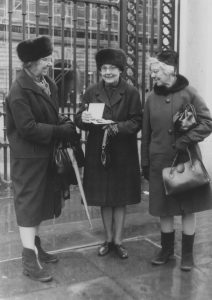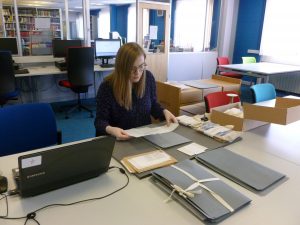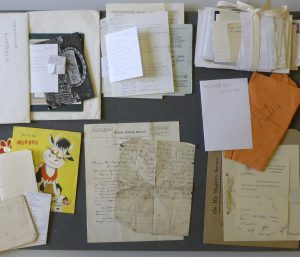June 26, 2017, by Kathryn Steenson
Veterinary Verse: The life and rhymes of Connie Ford
With a rich history of rebellion, Nottingham has spawned many world-class writers over the past few hundred years – from Byron to D.H. Lawrence and to Alan Sillitoe. However, the archives of Manuscripts and Special Collections hold the collection of one more rebel writer who can be added to Nottingham’s illustrious literary history: Connie Mae Ford.
Over the past few months, I have had the privilege to volunteer with the Connie Ford Collection as part of my Project Dissertation with the School of English. Ford was an insatiable collector, keeping cassette tapes, toys, magazine clippings and hundreds of letters mostly kept in their original envelopes.
My task has been to go through the collection, and to sort and list the material that had not been organised, though I hadn’t expected to find such a marvellous character behind the material in the collection itself. Supplied with a spreadsheet, pencil and acid-free paper, I delved into the collection of a remarkable woman, who in 1933 graduated from the Royal Veterinary College in only the second group of professionally qualified female veterinarians. Hidden in the collection are many gems, whether it be previously unknown draft poems from her later years, or for her 1970 MBE for her work with the infertility of cattle at Sutton Bonington, which is in contrast to her lifelong support of communism. Ford was a relentless advocate for many causes, whether it be cross-cultural friendship between communities in Nottingham, women’s rights or communism, her varied activities are well documented by the letters held in the collection.
However while working through the material, it became apparent that Connie Ford was not just a respected vet and prolific letter-writer, but also an accomplished poet. Ford was an active member of the Nottingham Poetry Society for many years, and even won the Manifold Magazine’s John Masefield Prize for her poem ‘The Great Eastern’ in 1968, which was based on her grandfather’s diary. In her later years, Ford published four poetry books of her own work, and a biography of Britain’s first female vet, Aleen Cust. As a writer, Ford often drew inspiration from her love of Nottingham, such as her experiences of sailing on the Trent, although much of her poetry revolved around her political beliefs. Even though the collection was fairly varied in its subject matter, as a volunteer it was compelling to see how Ford’s poetical endeavours evolved over the years, and how her tenacious character never failed to exist in everything she did. This is especially true on poems such as ‘The General’, which was written on the back of a letter from the Thatcher government, written as a poetical revolt.
Whether it be finding a manuscript outline of an early draft of Aleen Cust, or seeing the gradual organisation of the collection itself, working with the Ford material has been a valuable and inspiring adventure through the archival boxes. Having the chance to explore the Connie Ford Collection as a volunteer is a wonderful experience, not only by working hands-on with original manuscripts, but by getting to know the character behind the collection itself. While her poems may not currently be well known, the literary legacy Connie Ford has left behind is a remarkable insight into the mind of a maverick Nottinghamshire writer.
This is a guest post by Elizabeth Ingham, final year undergraduate, who worked with the Connie Ford Collection as part of her placement with the School of English. To read more about her placement, please see our Spring 2017 newsletter, Discover. For more information about Manuscripts & Special Collections, including how to visit, please see our website. The Papers of Connie M Ford (1912-1998), poet; 1932-1998 are available to search in the online catalogue and can be viewed by appointment in the Reading Room.




Hello. The Animal and Plant Health Agency is planning to write a piece on Connie Ford in 2018. Throughout the year, we want to showcase via a series of blog posts the incredible achievements of women scientists working within the agency (and its predecessors) as part of our celebration of the 100th anniversary of women’s right to vote and join the Civil Service. I’d like to get in touch with someone from Nottingham University archives who deals with the Connie Ford collection. We’d be interested if you had documents pertaining to her time working at AHVLA at Sutton Bonington which we could include copies of in our story. Could someone get in touch with me please?